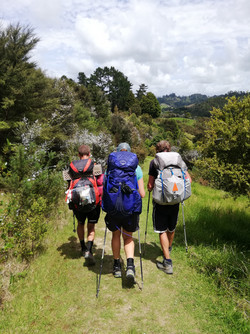Dissertationproject of Paulina Zäck

'Long-Distance Hiking. An Anthropological Study on the Social and Cultural Practice of Modern Pilgrimages'
Walking is one of the most primitive ways of getting around. For thousands of years people have walked exclusively, workers, traders, pilgrims, messengers – entire migrations of peoples took place. Long-distance hiking, however, the phenomenon of voluntarily covering hundreds to thousands of kilometers at once, freely deciding on months of physically and mentally strenuous activity without having an outwardly obvious or tangible sense or purpose, learned their popularity much later.
The doctoral project 'Long-Distance Hiking. An Anthropological Study on the Social and Cultural Practice of Modern Pilgrimages' wants to approach the modern practice of long-distance hiking from an anthropological perspective, and question why people embark on such a journey, what motives, motivations and expectations lie behind it, how the everyday hiking is constituted and managed by its actors, and how long-distance hiking is to be understood and experienced in the age of global hypermobility, a changing environmental awareness and in the context of an increasingly fast-moving, performance- and consumption-oriented society in which many hikers locate themselves.
Based on ethnographic field research along the American Appalachian Trail and particularly in the context of anthropological pilgrimage and ritual research as well as with regard to conceptual debates of the human-environment relationship and various other interdisciplinary reference fields, the doctoral project examines the social relationships on the long-distance hiking trail and within the hiking community, its power for individual change and growth, the ritual nature, physicality and symbolism as well as the material culture of the long-distance hiking trail itself. And it deals with the question of historical development: How has long-distance hiking changed over the last few decades? How can the steadily increasing number of long-distance hikers be explained? Has new technology, globalization, social media or the increasing urge for self-discovery and self-change created a new generation of long-distance hikers?
Short biography:
Paulina Zäck studied anthropology and music mediation (B.A.) at the University of Cologne from 2014 to 2018 and at the San Diego State University as part of a semester abroad in 2016. She completed her master's degree in social and cultural anthropology at the Freie Universität Berlin in 2021. In the course of her master's research, which was already located in anthropological pilgrimage research, she spent 4 ½ months in New Zealand to explore the long-distance hiking trail Te Araroa and its actors. Since April 2022 she has been a doctoral student in the Integrated Track of the a.r.te.s. Graduate School of the Humanities Cologne, where she is now deepening her research interests. Her dissertation project is supervised by Prof. Dr. Thomas Widlok.
Contact: pzaeck@gmx.de
